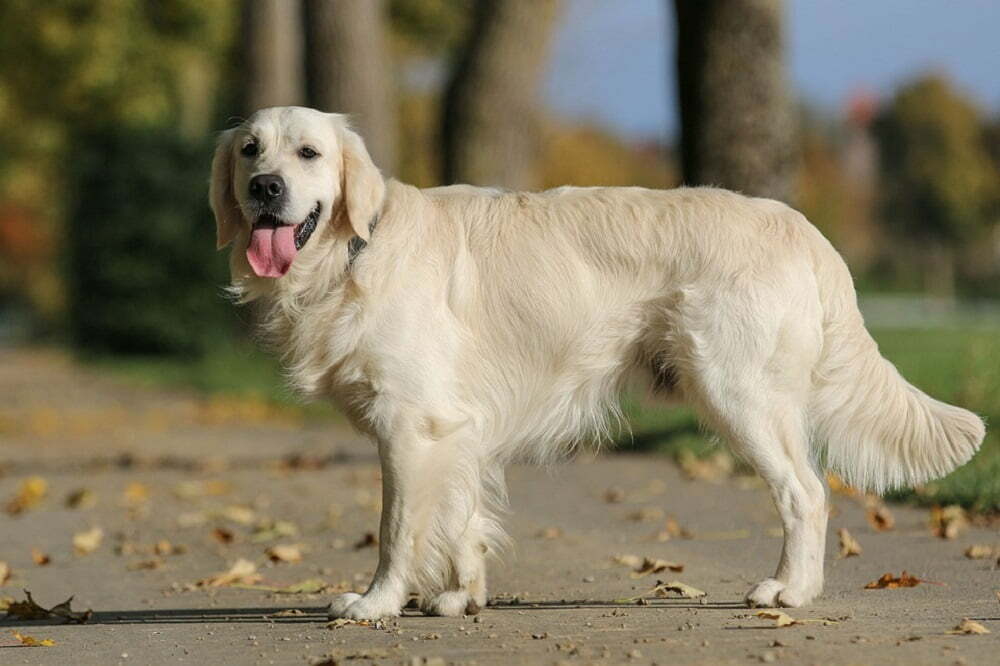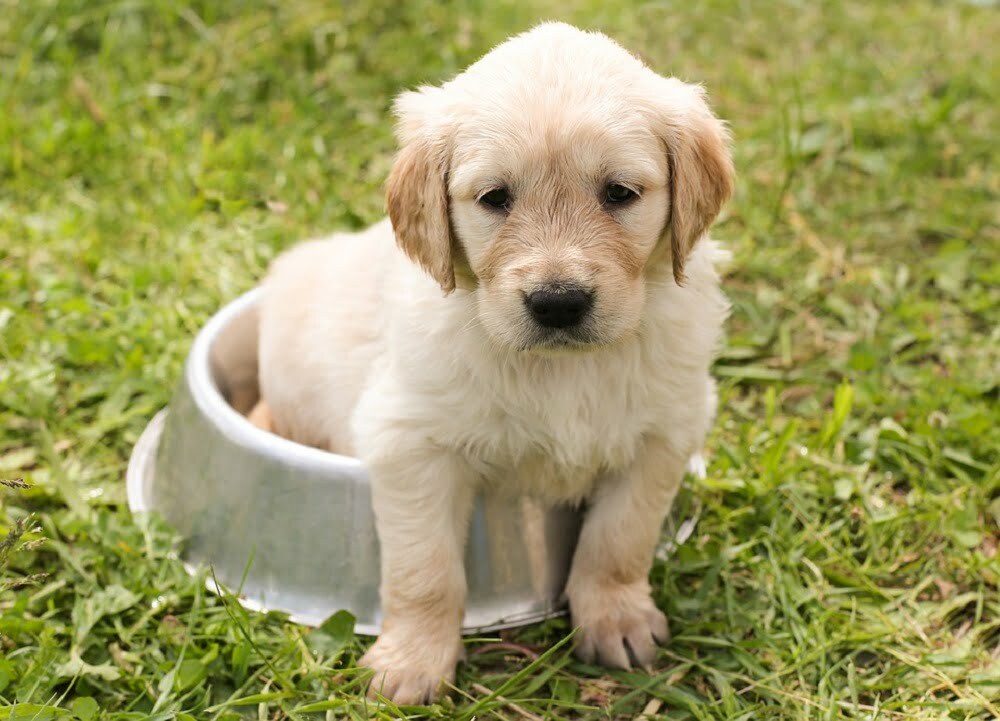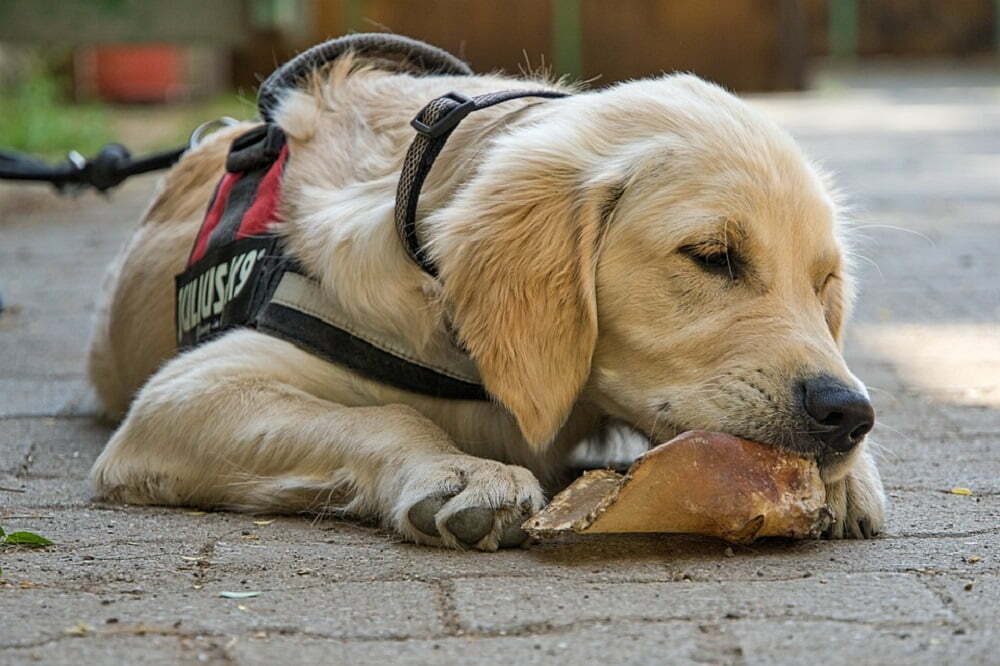If you are currently considering getting an adorable dog, then we’re sure that you’ll know that choosing to buy a dog is nothing short of one of the biggest decisions that you can make! Not only is a dog a long-term commitment, but dogs require plenty of love, care, and attention – so it’s important to make the right choice.
Known for their gentleness and friendliness, the Golden Retriever is deemed as being one of the most loveable and loyal breeds of dog out there, which in turn means that the Golden Retriever makes a wonderful companion and an even better family dog. However, is the Golden Retriever the right addition to your home?

This is where we come in to lend you a helping hand. If you’re considering welcoming a cuddly Golden Retriever into your household, this guide is for you. Below, you will find a deep dive look into this popular breed so that you can decide whether or not the Golden Retriever is right for you and your family. Ready? Just read on!
What is the Golden Retriever dog?
As we’re sure you might already be aware, the Golden Retriever dog is a gentle and friendly dog with a mellow disposition. They are known for their loyalty to their owners and enthusiastic nature, and love nothing more than to hang around their owners and get involved, regardless of whether you might be at the local dog park or having a cozy night in.
As a Retriever breed of dog, it’s important to note that the Golden Retriever won’t shy away from digging, exploring, and trying to catch a bird or two! They are relatively active dogs that love to run around and burn off energy and are characterized by their love of socializing, whether that be with a family friend, stranger, or another dog.
The Golden Retriever was first bred in Scotland during the mid-19th century and was specifically bred for wildfowl hunting, a very popular recreational sport enjoyed by the Scottish elite.
At the time, the Retriever breeds that were already in existence were unable to retrieve the caught fowl (on both land and water) and the effective retrieval of the caught fowl was imperative to the enjoyment of the game, as the hunting grounds were full of marshy puddles and swampy ponds.
For this reason, the Scottish elite decided to cross existing retrievers with the best water spaniels, and in turn, the adorable Golden Retriever was created. The first recording of the Golden Retriever breed standard was taken in Glen Affric in Scotland and is widely believed to have originated from the Russian tracker dog, which is unfortunately now extinct.
Personality traits of the Golden Retriever dog:
Hailed as being the perfect dog, the Golden Retriever is a gentle and loving dog with a relaxed, mellow nature. Known as being wonderful with children, Golden Retriever’s are very patient with little ones and can spend hours upon hours playing and cuddling children, which means that they make wonderful family dogs!
They’re cherry, forgiving, and extremely trustworthy with all, including young children and other animals. As an active breed, the Golden Retriever requires plenty of exercise each day to burn off energy and thrives best in environments where socialization is possible. So you’ll need to ensure you regularly visit the local dog park.
Though the Golden Retriever is prone to barking, the Golden Retriever is rarely ever aggressive and instead usually chooses to gain attention from passers-by or to show excitement by barking, and is friendly towards all – including children, strangers, other dogs, and even cats!
Plus, thanks to their everlasting childlike spirit, the Golden Retriever has a playful personality that will last throughout the entirety of their lives and loves to play games with their owners, including fetch, chase, tug of war, and many more.
As a side note, due to this playfulness, it is worth keeping in mind that the Golden Retriever can be one of the most difficult breeds of a dog to train as an adult. For this reason, it is imperative that all Golden Retrievers are given obedience training as early as possible in their life, as this will help to ensure good manners and a mellow temperament.
Physical traits of a Golden Retriever dog:

Though the Golden Retriever is one of the most recognizable dogs in the world, we still think it’s important to cover the physical characteristics commonly associated with this breed, as this will give you a better understanding of the Golden Retriever, as well as whether getting one is the right choice for you and your family.
As we’re sure you already know, the Golden Retriever is a large-breed dog with a shiny, soft golden coat. This coat is water-repellent and able to keep the body warm during the cold winter months, and is often either straight or wavy, depending on the breeding. In addition, the Golden Retriever is also attracted by beautiful feathering across the neck, legs, underbelly, thighs, and tail, making them look cuddly and adorable.
The head of the Golden Retriever is strong with brown eyes. The shape of the mouth is also commonly shaped in such a way that makes it look as though Golden Retrievers are constantly smiling, which only adds to the loveable appeal of this popular breed of dog.
Additionally, even though the eyes are not overly large, they are located quite high on top of the head and often droop downwards slightly to meet the jawline.
To give you an idea of size, the average size of a Golden Retriever male is usually around 58-62cm in height and can often weigh anywhere from 28 to 32kg. As for female Golden Retrievers, they are usually slightly smaller than male Golden Retrievers, can weigh anywhere from 24 to 29kg, and are usually around 53-55cm in height.
Health traits of the Golden Retriever dog:
Golden Retrievers are prone to developing a variety of different health conditions, including allergies, cancer, skin problems, hypothyroidism, ear problems, eye problems, and more. For this reason, you will need to make sure that you are taking your Golden Retriever for annual checkups at the vet.
How to care for a Golden Retriever dog:
The Golden Retriever dog is generally quite easy to care for, and you’ll likely find that most of your caring ability comes from your own intuition and common sense. However, to help you along the way, here are some of the basic ways that you will need to care for your Golden Retriever dog:
- Daily Exercise
As we’ve already mentioned above, the Golden Retriever is a highly energetic and lively breed, so you’ll need to ensure that your one gets plenty of exercise each day.
You should take your Golden Retriever out for at least one walk a day to get fresh air. If possible, we strongly recommend taking your Golden Retriever to a local dog park or somewhere similar, as this will mean that your dog will be able to socialize and interact with others dogs and humans, while also burning off any pent up energy from the day.
In addition to daily walks, you should also ensure that your Golden Retriever has plenty of toys to play with throughout the day and a backyard to run around in.
Golden Retrievers love to get involved with whatever their owners are doing, so we also strongly recommend playing interactive games with your Golden Retriever, as this will be extremely enjoyable for them.
Not only that, but seeing as Golden Retrievers love to help, you could also keep your Golden Retriever engaged and entertained throughout the day by teaching them tricks and commands to help around the house.
This could be as simple as helping you to take in groceries or even closing the door, but these sorts of activities will be extremely fulfilling for your Golden Retriever and will also help them to channel their mounds of playful energy.
- Regular Check-Ups
As a purebred dog, Golden Retrievers are at a higher risk of developing certain types of health issues. For this reason, it will be your responsibility as an owner to ensure that you regularly take your Golden Retriever for general check-ups at the vet.
- Nutritious Diet and Grooming Routine
One of the most important aspects of caring for your Golden Retriever will be to make sure that they are healthy and happy. You should be sure to feed your Golden Retriever a highly nutritious and well-balanced diet suitable for their breed while also making sure that you are not feeding them any foods that could be potentially harmful, such as grapes and other foods that may seem to be harmless.
For this reason, we recommend you regularly research and educate yourself on what foods suit your Golden Retriever.
In addition, you should also ensure that you regularly groom and care for your Golden Retriever. As we’ve mentioned above, Golden Retrievers are prone to shredding, so you will need to ensure that you brush at least once a week and bathe at least once a month.
The average lifespan of a Golden Retriever dog:
The average lifespan of the Golden Retriever dog is around 10-12 years, although do keep in mind that this timeframe can differ from dog to dog. In order to maximize the lifespan of your Golden Retriever and help ensure that your dog has the best quality of life, you should be sure to take your Golden Retriever for regular checkups at the vet.
Besides ensuring that you are given the peace of mind that your dog is nice and healthy, the golden retriever is at risk of developing certain health ailments, so it will be your responsibility to ensure that your dog gets regularly checked.
The average price of a Golden Retriever dog:
Though the price of a Golden Retriever dog will no doubt vary, the average price of a purebred Golden Retriever is often anywhere between $500 to $3000. Alternatively, you could also opt to adopt a Golden Retriever, and adoption fees are usually somewhat cheaper than buying from a breeder and usually fall somewhere between $50 to $300.
However, the price of a Golden Retriever dog will not end there. Besides the initial purchase price, you will also need to keep in mind that you’ll be making a dog ownership commitment that could last you more than a decade. For this reason, if you decide to introduce a loveable Golden Retriever into your home, you can expect to spend upwards of $15,000 on food, veterinary care fees, bedding, toys, and more.
Frequently Asked Questions

What is bad about Golden Retrievers?
Despite their friendly and loving nature, Golden Retrievers are purebred dogs, which means they can be at risk of developing various health problems. Some of the most common health problems associated with the Golden Retriever breed are cancer, heart disease, cataracts, epilepsy, skin conditions, as well as hip and elbow dysplasia.
Why are Golden Retrievers so smelly?
Golden Retrievers tend to have that typical “dog” smell because they have thick coats that can trap dirt and debris more easily than other types of dogs. For this reason, it’s very important to ensure that Golden Retrievers are given regular baths to prevent any unwanted odors.
Do Golden Retrievers like to cuddle?
Yes, Golden Retrievers are very sociable and affectionate dogs that love to snuggle up to their owners. They are also highly trustworthy and patient with children, which makes them fantastic family dogs, as they love to be around little ones. Additionally, Golden Retrievers are also extremely intuitive and compassionate and can often sense feelings of distress and even sadness in humans.
For this reason, if you are planning on getting a Golden Retriever and happen to tear up at the occasional sad film – don’t be surprised if you find your Golden Retriever nudging at you for a snuggle to cheer you up.
Are Golden Retrievers high maintenance?
Golden Retrievers are relatively high-maintenance breeds of dogs, and this is something that should certainly be taken into consideration prior to getting one. Even though Golden Retrievers have a very easy-going and affectionate nature, they are also extremely energetic. They will need regular, daily exercise to keep them happy and prevent them from becoming naughty due to pent-up energy.
Golden Retrievers are also known to be quite needy, which means that they commonly tend to require more attention than other types of dog breeds. This can therefore mean that they are at a higher risk of developing separation anxiety from their owners.
In addition to this, Golden Retrievers also tend to shed quite a lot, which is something that you will need to keep in mind, as not only will you need to have a regular grooming routine, but you will also likely need to clean up any shredded hairs around your home on a daily basis.
Are Golden Retrievers good at home alone?
Golden Retrievers are a highly sociable breed of dog, so they do not naturally like to be alone. However, it is possible to leave your Golden Retriever at home, so long as you have made sure that your dog is comfortable in his environment and has access to food and water.
Needless to say, you should not leave your Golden Retriever at home for long periods of time, as not only will your Golden Retriever require bathroom breaks and fresh air, but it may also cause distress to your dog, as the Golden Retriever is a breed of dog that is susceptible to developing separation anxiety.
Are Golden Retrievers good with kids?
Yes! Golden Retrievers are exceptionally good with kids. They are kind-natured and patient dogs that absolutely love to be a part of a family unit. Golden Retrievers are very intelligent and able to recognize a child from an adult, so they can be very kind and gentle to babies, toddlers, and small children.
On the flip side, Golden Retrievers can switch it up and play rough with adults and older children, making them a perfect choice for families looking for their forever dog.
